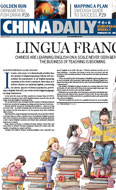Society
Ransom expert bargains cash for lives
Updated: 2011-02-19 06:41
By Peter Apps (China Daily)
Former intelligence officer stays cool during negotiations with hijackers
LONDON - When John Chase's phone rings, he does not know whether he will be called to deal with a Somali pirate hijacking, a Latin American commercial kidnapping or an aid worker held hostage in Afghanistan.
An 18-year veteran of the largely London-based kidnap-and-ransom insurance industry, his job is to help his firm's clients manage the business of hostage negotiation, literally bargaining for lives with suitcases of cash.
In some ways, it is a process that traders, litigators and shoppers are familiar with. It is all about finding the price range, talking down the seller's expectations and closing a deal with kidnappers who can be as professionals as the negotiators.
"It's not exactly haggling," Chase told Reuters in the iconic glass and metal Lloyd's of London building, the center of Britain's insurance industry and home to his employer, risk advisory firm AKE. "Everyone usually knows what the market price really is. It's about arriving at it in a believable way."
But that can take months - a long, awkward process in which negotiators like Chase must deal with traumatized families and worried employers, jumpy gunmen and interfering officials.
"You have extreme emotion and stress, particularly with families," Chase says. "You have to manage that. Knowledge and experience is a comforting thing. But you learn every time. Things happen you couldn't make up."
The Canadian-born former intelligence officer is one of only a few dozen "K&R" specialists working for a handful of firms on behalf of insurance and reinsurance companies.
Most K&R consultants are ex-military, intelligence or law-enforcement, but Chase says all that is needed is a cool head, the ability to cut a deal and work in difficult circumstances.
Sometimes they go into the field to broker a deal, sometimes - particularly with piracy - they spend time in a client firm's operations room, managing negotiations from there.
The insurance sector began writing specific K&R policies in the late 1970s. Buyers now range from resource to media firms, aid groups and, increasingly, shipping companies wanting protection against growing Somali piracy.
Ransom safer
One insider estimates that the industry generates $500 million in premiums a year, with most recent growth in the marine sector.
As more ships have been hijacked, ransoms have grown and so have the procedures for negotiation. Ships' captains may have a telephone number to call and prearranged codes to confirm the crew remain alive.
The method of ransom delivery is usually the same: waterproof containers of cash dropped by air into the water after a light aircraft has circled the ship while the hostages line up on deck to be counted by the K&R team.
But kidnap patterns change constantly. Mexico provides a growing caseload, while other one-time hotspots such as Colombia and Iraq appear in decline, at least temporarily. Meanwhile, there is always some work in Europe and North America.
Critics say paying ransoms perpetuates the kidnap industry. But holding hostages for ransom has been a tactic of governments, warlords and militants throughout history. K&R insiders say ultimately paying up is the most reliable way of getting someone back alive.
Chase says teams he has been involved with have only ever lost two hostages. They have got back hundreds alive.
One was a hostage in Latin America who was killed while trying to escape. Another was among the dozens executed in Iraq in retaliation for the hanging of Saddam Hussein.
That contrasts with the much higher risks in the event of an attempted military rescue, with the danger of a hostage death sometimes estimated as high as 50 percent.
"As soon as people start shooting, it gets dangerous and unpredictable," Chase says. "It is something you really want to avoid. There are just too many cases of it going wrong."
Reuters
(China Daily 02/19/2011 page6)
E-paper

Chinese tourists as top shoppers
Since last summer, Chinese tourists emerged as the top tax-free shoppers in Europe.
Golden run ahead
Looking abroad
Mapping out a plan
Specials

The green lantern
Environmental concerns are shedding new light on a colorful tradition

Inland interchange
Chongqing bets on its position as a hub for China's west.

Zooming in on Chinese skies
Helicopter companies ride on country's growing interest in luxury aviation.
